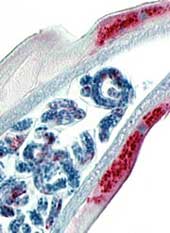
A team of chemists and physicists at the Universities of Liverpool and Oxford have shown that hydrogen transmits magnetism. This discovery could be the first step to a new class of magnetic materials, and opens up a new field of chemistry.
The team, headed by Professor Matthew Rosseinsky of the Department of Chemistry, University of Liverpool, and including Dr Stephen Blundell of the University of Oxford, has prepared a new magnetic oxide material in which for the first time the dominant ma

Patients on new Angina Plan report 40% reduction in angina attacks per week New research published in the British Journal of General Practice revealed that patients on the York Angina Plan, compared to those receiving a conventional educational session, reported a 40% reduction in the number of episodes of angina per week (a reduction of three from the baseline mean of seven attacks). This was despite the fact that they were more active. They also showed a lower level of anxiety and d

Research by a University of Sunderland psychologist has revealed that one in four people may have a special gift for predicting uncertainties like the weather.
Tests carried out by Professor Richard Heath, from the university’s Business School, also showed that this uncanny ability could possibly extend to the financial markets.
During his research volunteers were shown temperature figures for the previous eight days and were asked to predict the following four days.
The f

Five times as much water as in all the world’s oceans may lurk deep below its surface.
Geologists have divined water where you might least expect it: 1,000 kilometres below the Earth’s surface. Here, rocks heated to over 1,000 oC and squeezed under high pressures may harbour around five times as much water as in all the world’s oceans. This could give clues to how the Earth formed and how it behaves today.
Between 650 and 2,900 km below the Earth’s surface hot, compressed mi

Microbes, not the worms that carry them, aggravate the immune system.
Stowaway bacteria inside parasitic worms, and not the worms themselves, cause river blindness, according to new research. The finding could lead to better ways of preventing or treating the debilitating disease.
River blindness, or onchocerciasis, affects some 17 million people throughout central Africa and in parts of Arabia and South America. Sufferers develop inflammatory conditions. When inflammation

Salt is critical to the brain development of premature babies, suggests research in the Fetal and Neonatal Edition. Language, memory, intelligence and coordination were all better in children, who had been born premature but whose diets had been supplemented with salt shortly after birth.
The study focused on 37 children who had been monitored since birth. All had been born before or at 33 weeks of pregnancy. Between the ages of 10 and 13 the children were tested for competency in movement a

– new calculation confirms standard model of particle physics. Contribution of hadronic vacuum polarization determined with unprecedented accuracy. The magnetic moment of the muon is an important precision parameter for…
Technique may prevent formation of unwanted waves that siphon off needed energy. Heating plasma to the ultra-high temperatures needed for fusion reactions requires more than turning the dial on a…

An international team of astronomers, led by researchers from the Astronomical Observatory of the University of Warsaw, have identified a new class of cosmic X-ray sources. The findings have been…

How deubiquitinases USP53 and USP54 cleave long polyubiquitin chains and how the former is linked to liver disease in children. Deubiquitinases (DUBs) are enzymes used by cells to trim protein…

Conceptual blueprint to analyze experimental catalyst data. Machine learning (ML) models have recently become popular in the field of heterogeneous catalyst design. The inherent complexity of the interactions between catalyst…

Antibody that Neutralizes Inhibitory Factors Involved in Nerve Regeneration Leads to Enhanced Motor Function after Acute Spinal Cord Injury. Researchers at 13 clinics in Germany, Switzerland, the Czech Republic and…

How simulations help manufacturing of modern displays. Modern materials must be recyclable and sustainable. Consumer electronics is no exception, with organic light-emitting diodes (OLEDs) taking over modern televisions and portable…

“Neurons that fire together, wire together” describes the neural plasticity seen in human brains, but neurons grown in a dish don’t seem to follow these rules. Neurons that are cultured…

The quest for sustainable energy solutions has been a major focus of scientific research for decades. Solar energy, a clean and renewable source, has emerged as a promising alternative to…

With a processing speed a billion times faster than nature, chip-based laser neuron could help advance AI tasks such as pattern recognition and sequence prediction. Researchers have developed a laser-based…

New technology could remotely identify various types of plastics, offering a valuable tool for future monitoring and analysis of oceanic plastic pollution. Researchers have developed a new hyperspectral Raman imaging…

Artificial Intelligence (AI) has established a strong presence across industries, large and small. The “VoBaKI” research project has empowered small and medium-sized enterprises (SMEs) with an innovative tool to independently…